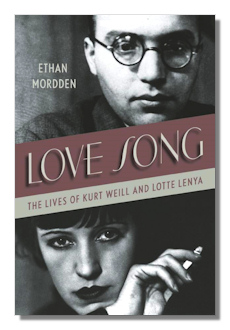
The Internet's Premier Classical Music Source
Related Links
-
Introduction
Acoustics
Ballet
Biographies
Chamber Music
Composers & Composition
Conducting
Criticism & Commentary
Discographies & CD Guides
Fiction
History
Humor
Illustrations & Photos
Instrumental
Lieder
Music Appreciation
Music Education
Music Industry
Music and the Mind
Opera
Orchestration
Reference Works
Scores
Thematic Indices
Theory & Analysis
Vocal Technique
Search Amazon
Recommended Links
Site News
 Book Review
Book Review
Love Song

The Lives of Kurt Weill and Lotte Lenya
Ethan Mordden
St. Martin's Press. 2012.
334 pp., incl. index
ISBN-10: 0312676573
ISBN-13: 978-0312676575
Summary for the Busy Executive: Chatty.
By the time of his death, Kurt Weill's promise seemed to have fizzled out. The standard line ran that after European artistic success, he sold out in America to Broadway. Adorno, Schoenberg's acolyte, deemed Weill's music worthless – to be expected – and other critics piled on. Then came Blitzstein's translation of The Threepenny Opera, with Lotte Lenya, Weill's widow, in the role of Jenny, and it triumphed in New York. People slowly began to wake up and gain an interest at least in Weill's European work, again brought to the public by Lenya, who recorded almost all of Weill's work with Bertolt Brecht. Since the Seventies, Weill's European work has enjoyed genuine revival. It's taken a bit longer for writers to appreciate his American period. But the Renaissance didn't touch Weill alone. Lenya herself re-emerged as one of the century's great actresses, as well as an icon of the Weimar Republic.
Indeed, for a long time Weill was really Weill-Lenya, an inseparable duality, even though Weill, according to Lenya herself, had written very little for her to sing, a strictly accurate remark. Her big hit, "Seeraüber-Jenny" (Pirate Jenny), was actually performed by another character in the original Berlin production of Dreigroschenoper, although Lenya recorded it shortly after. Weill was also a dramatist, a superb delineator of character through music. He could create not only the cynical but also the sincere. Yet Weill without Lenya is unthinkable. If he didn't write specifically for her voice, he wrote for her attitude and aura.
Mordden's book is extremely difficult to categorize: part history, part meditation, part critical argument, part gossip. It goes all over the place in search of a thesis. Mainly, however, it keeps to Weill and Lenya's theatrical careers, with side trips to anecdote. I disagree a bit with his analysis of the marriage – to be fair, extremely unconventional, including a five-year period of divorce. Lenya comes off as an exuberant sexual omnivore, and Weill as a music dweeb, patiently waiting for her to return to him as he buried himself in composition. I strongly suspect Weill wasn't so ascetic, that he too had his affairs, although more quietly than Lenya. Part of my doubt comes from Lenya herself, who sometimes told the story of allowing Weill's last mistress private time at the graveside. Was Lenya truthful? Given her guilt-free attitude toward sex, I see no reason why she would lie. At any rate, Mordden fails to disprove her.
A prose virtuoso, Mordden reminds me of the conversationalist determined to scintillate. This is one very entertaining read. His judgments on Weill's work – particularly his promotion of "one Weill" over a bifurcation of work written in Europe and that written in America – strike me as solid. I like what he has to say about Lenya as an actress and singer as well. On the other hand, at times he indulges in the "inside" – a glancing remark that assumes you're au fait with theatrical chit-chat. I suppose he means to flatter, but it does annoy me, particularly since a phrase of explanation would really cost so little work. The flip side of this, however, is truly brilliant historical insight into his subjects' times delivered almost epigrammatically.
Bonuses include a very entertaining annotated bibliography as well as a similar discography. I don't agree with judgments of particular books or discs, but I neither expect nor especially want to hear my own opinions come back to me all the time.
Those of you who want to delve into two fascinating and essential forces of the Modern era but don't want to wade through the academic scholarship (and prose) won't do better than this book. A bright addition to Foster Hirsch's marvelous Kurt Weill on Stage.
Copyright © 2013 by Steve Schwartz.



















